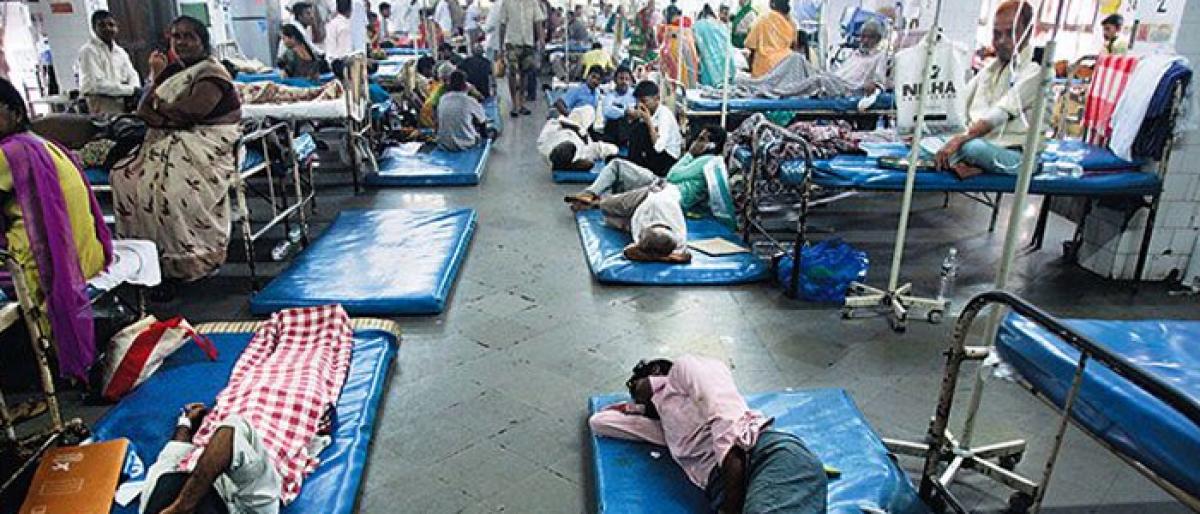Live
- Bank Nifty at record high levels
- Ola Cabs CEO Hemant Bakshi resigns, firm plans to cut 10 per cent jobs
- CM's post in buzzing capital like Delhi not ceremonial, office holder has to be available 24x7: Delhi HC
- SC refuses to halt Calcutta HC order axing 25,753 school jobs, stays CBI probe against govt officials
- Aparna Dixit seeks divine blessings at Mahakaleshwar temple in Ujjain
- HM Amit Shah's doctored video: Delhi Police summons three Telangana Congress leaders
- TN: Devotee dies in Velliangiri temple trek, ninth this season
- All educational institutions in Kerala's Palakkad ordered closed amid heatwave
- Calcutta HC refuses to interfere with order staying police probe on national anthem case
- Five PMs in five years is INDIA bloc's new formula: PM Modi's swipe at Oppn alliance
Just In

Half a century ago, Sarkari Davakhana was the only place to go for treatment, for both the rich and the poor. The doctors there used to charge extra amount unofficially for treatment and Class IV employees used to squeeze the patients. Many like me thought why private medical care was not available and we had to submit ourselves to this type of treatment in government hospitals.
Half a century ago, Sarkari Davakhana was the only place to go for treatment, for both the rich and the poor. The doctors there used to charge extra amount unofficially for treatment and Class IV employees used to squeeze the patients. Many like me thought why private medical care was not available and we had to submit ourselves to this type of treatment in government hospitals.
Around that time a medical professional Pratap Reddy returning from America thought of starting private medical care in the corporate sector. Accordingly, the Apollo group was born and today after half a century, medical care in India for those who can afford or cannot afford is in the hands of the private sector.
In retrospect, many of us feel the Sarkari Davakhana with all its limitations and corruption is far better alternative to what we have as a medical care in the private sector today.
We have a peculiar situation in our country today of a government which has abdicated its responsibility to healthcare for its citizens and a private corporate health sector uncontrolled and not regulated by any regulatory body and a health insurance sector which is underdeveloped. A combination of the above have ensured growth of an imperfect healthcare system putting the healthcare of millions as well as their finances at stake.
The latest National Health Accounts Estimates for 2014-15 throw light on the sad state of affairs of health sector in India. Out of the current health expenditure in the country 71% is contributed by the households whereas the union government contributes only 8% and state governments13% and the contribution by health insurance sector is just 3.7%.
Out of the expenditure on health, private hospitals get 26%, government hospitals 14% and pharmacies 29%. Total health expenditure as a percentage of GDP is about 3.89%, out of which the government expenditure as a percentage of GDP is only 1.13% –what is spent by households is 2.4% of the GDP. The amount contributed by the health insurance to healthcare is just insignificant as pointed out earlier.
The following policy alternatives emanate from an analysis of the aforementioned data. Since pharmacy is taking a major portion of the expenditure, popularisation of generic medicines and making them available across the country is going to help the households who are spending a fairly large percentage of their income on healthcare.
There is also need to strengthen the government hospital systems and make them effective alternatives to private healthcare. There is a need for increasing healthcare expenditure both in the central as well as state sectors as a percentage of the GDP.
The 14th Finance commission increased the state share in the divisible pool of central taxes to 42%, facilitating unconditional transfer to the state governments so that they can determine the priorities of spending at their level. But unfortunately the priorities of the state governments differed from state to state. In a state like Andhra Pradesh where expenditure on irrigation has increased by 57% in2017 compared to 2016 expenditure increase on health during the same period is only 13%.
In contrast, states like Bihar and Chhattisgarh have increased their expenditure on health during the same period by 64% and 51% respectively. Thus, the presumption that unconditional transfers would result in spending on social sectors of relevance by all the states is belied and expenditure patterns are different in different states.
Especially, the states which have mastered the technique of using irrigation expenditure as a means of generating kickbacks to Finance election expenditure are hardly going to increase expenditure on basic health and education as compared to irrigation. Poorer states are doing better in terms of increased spending on health and education post 14th Finance Commission increased devolution of taxes.
Though the need for stepping up expenditure on basic health and education is accepted by all, they do not figure as part of the Terms of Reference to 14th Finance Commission or those of the 15th Finance Commission. It would be appropriate if this is made an important part in the ToR to the 15th Finance Commission by an amendment even now so that adequate funding to both these sectors is assured in days to come.

© 2024 Hyderabad Media House Limited/The Hans India. All rights reserved. Powered by hocalwire.com







